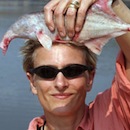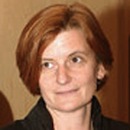Advisory Board and Editors Evolutionary Studies

Michael S. Singer
Professor of Biology and Environmental Studies at Wesleyan University. Research focus on the role of tri-trophic interactions in evolutionary, community, and food web ecology. Additional specific expertise in plant-insect interactions and Lepidoptera.

Mar Sobral
Spanish Evolutionary Ecologist. Formerly at Stanford (US) and CNRS (France). Now at USC (Spain).
My research looks at the evolutionary ecology of plant-animal interactions and the impact of global change on biodiversity, particularly regarding ecosystem functions and services such as carbon storage.

Victoria Sosa
PhD from the University of California, Berkeley. Research interests include the phylogeny and evolution of plants with a particular focus on groups of vascular plants that are distributed in Mesoamerica and especially endemic to Mexico. Also interested in cloud forest flora. Systematics and taxonomy of orchids in Epidendreae are as well part of my interests. In addition, I am conducting investigation on diversity, evolutionary biology and ecology of geophytes an interesting life form in plants. Genomics and economic botany of underutilized fruits is one of my new lines of research.

Valeria Souza
Full professor at the Universidad Nacional Autónoma de México. Winner of several national conservation awards. Expert on microbial evolutionary ecology, works studying microbial mats and complex communities at Cuatro Ciénegas Coahuila, Mexico

Matt Sponheimer
Matt does research on the ecology of early hominins and associated fauna in Africa. He has also directed and co-directed several multidisciplinary projects on the ecology of living mammals, both large and small, in South Africa. He is the director of the Nutritional and Isotopic Ecology Lab (NIEL) at the University of Colorado at Boulder.

Melanie L.J. Stiassny
Axelrod Research Curator of Fishes, Division of Vertebrate Zoology, and Professor, Richard Gilder Graduate School at the American Museum of Natural History.

Sankar Subramanian
Senior Lecturer at the University of the Sunshine Coast, Moreton Bay, Brisbane, Australia; USC Senior Research Fellow; Smithsonian Fellow; Adjunct Research Fellow (Griffith University)
Dr Sankar Subramanian is a Senior Lecturer in Genetics. Sankar joined USC as a Senior Research Fellow in March 2017. Prior to this he worked at the Australian Research Centre for Human Evolution, Griffith University. His research primarily centers around the question of, how does genetic drift influence mutations. Sankar worked on a number of research projects to investigate the interaction between drift and mutations, which include the evolution of codon usage bias in animal genomes, temporal patterns of deleterious mutations in humans and penguins, difference in the allele frequencies of polymorphisms in global human populations. Sankar has developed methods to identify and quantify deleterious mutations in human populations. Dr Subramanian is also interested in estimating rates of mutations and divergence times between species and populations. His research also focuses on studying ancient genomes to understand the past demographic history of vertebrates including ancient penguins, tuatara (a New Zealand reptile), moa (an extinct bird) and ancient humans. Furthermore, he is investigating the population history, mutational load and admixture patterns of modern and ancient Aboriginal Australians. At USC, he has started working on the conservation genomics of Australian Dingoes.

Genlou Sun
Professor of Plant Molecular Genetics and Evolutionary Biology, Editorial Board members of Molecular Breeding, Frontier in Genetics, PLOS ONE, Acta Agronomica Sinica and Diversity

Armando Sunny
Dr. Armando Sunny is a Researcher and Professor within the Applied Biological Sciences Research Center, Science Faculty at the Autonomous University of the State of Mexico (UAEM).
He is interested to know how certain features of the landscape affect the genetic diversity and structure of species in anthropized environments, for this he performs analysis of landscape genetics, population genetics, niche modeling, SIG, landscape connectivity and global change analysis, especially in amphibians and reptiles.

Xiaotian Tang
Dr. Xiaotian Tang is now an assistant professor (ZJU100 Young Professor) at Zhejiang University. He was a postdoctoral associate at Yale School of Medicine. His research interests include vector-borne diseases of animals and plants, and arthropod-pathogen-host interactions. He is also interested in evolutionary biology of arthropods.
He has over 40 publications in high-quality peer-reviewed journals, including Cell, PLOS Biology, eLife, Cell Reports, and Science Translational Medicine. He has served as academic or review editor for 4 journals and reviewer for over 20 journals.

Jonathan C Thomas
I am currently a Senior Lecturer in Microbial Genomics at Nottingham Trent University and one of the curators of the S. epidermidis MLST database.

Julie D. Thompson
Until 2013, Senior research scientist at the Institute of Genetics and Molecular and Cellular Biology and University of Strasbourg, France. Currently, senior research scientist in Integrative Bioinformatics and Genomics at the ICube laboratory and University of Strasbourg, France.

